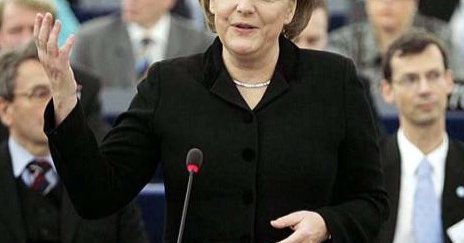Angela Merkel as European Council President managed something that was almost deemed impossible, namely to re-launch the reform process of the European Union and preserve the most important basic principles of the Constitutional Treaty, despite heavy resistance from several Member States.
However, this can hardly obscure the fact that the European Union by no means agrees about the aims and contents of a European policy. A Europe of common small reform steps paired with a Europe of two speeds will probably be much more frequently the case in the future. The diverse compromises and numerous opt-out possibilities already pin-point in that direction.
Changes in the new treaty system
The two and half year Presidency has been decided as envisaged by the Constitutional Treaty as well as an EU foreign minister, even though the post was renamed after pressure from the UK into “High Representative of the Union for Foreign and Security Policy”. In spite of Polish resistance the quality majority voting system as proposed by the Constitutional Treaty was put through, even if the double majority will be implemented only gradually until 2017.
The areas in which qualified majority applies were extended, but United Kingdom achieved an opt-out regulation in the field of justice and home affairs. In the social policy field opt-outs or enhanced cooperation of several states are also possible.
With the extension of quality majority decision also the role of the European Parliament was strengthened, which will in the future also co-decide with the Council over the EU-Budget on equal terms.
The EU Charter of Fundamental Rights was due to pressure of the UK left out of the Treaty text, but becomes nonetheless binding, despite being included just as a reference. For the UK a special arrangement applies.
A Europe of common small reform steps paired with a Europe of two speeds will probably be much more frequently the case in the future.
A sigh of relief but no enthusiasm
Even though the majority of stakeholders and politicians is relieved that the EU managed to break out of the deadlock in the reform process, a rare few will break out in enthusiasm after careful consideration of the results. The innovations were not adopted, as initially planned, within a Constitutional Treaty that would also have a symbolic and uniting effect on the European citizens, but were rather incorporated in the current system of EU-Treaties.
Thus the result is, as pointed out by Luxembourg’s Prime Minister Jean-Claude Juncker, even more complicated and less understandable for the layman as the initial Constitutional Treaty. The negotiations were again, unlike in the Constitutional Convention, conducted in a small intergovernmental circle behind closed door. The rejection of the Constitutional Treaty in the French and Dutch referendums thus didn’t lead to an open debate and a serious discussion of the politicians about the fears of the citizens but rather led to a return to traditional treaty negotiations between governments of Member States resulting in something vague enough that the current French president doesn’t need to call a referendum for. If this will get the European institutions closer to the citizens and foster their trust in them remains, however, more than questionable.
Independently from this critique the concluded reform steps were more than necessary and more than the achieved compromise would at present not be possible even with the best diplomatic skills. German Chancellor Merkel had used all her ability and flair as President of the European Council to get the EU back on track and enable it work better.
Now, however, it is high time for the planed IGC to become open and transparent, so that Europe can become a Europe of citizens again and not only of Governments. For that to happen it would also be desirable that Europe doesn’t settle for the reached compromise but calls for a new convention in the future that would work out a clear and understandable basis for the EU, which should be decided upon by the European citizens in an EU-wide referendum. Only in this way will it be possible to foster a truly European public debate resulting in Europe getting closer to the citizens.
Other results of the German EU presidency
The German EU Presidency of 2007 will go down in European history books on account of the resumption of the institutional reform process. However, an entire evaluation of the Presidency cannot rest solely on that but also has to take into consideration other policy areas.
The German government refers, for example, to the lower handling fees for transnational mobile phoning, the simplification of the transnational payments in the EU, the bureaucracy dismantling, the bigger consumer protection for credit applicants or the aviation agreement with the USA. In the field of environmental protection and climate change more was achieved than expected: the CO2 output should be lowered till 2020 by 20 per cent and electricity produced from water, wind, sun and biomass till 2020 raised by a fifth. However, crucial details, like the inclusion of the nuclear power, were adjourned.
In the field of justice and home affairs the incorporation of the Prüm Convention into the legal framework of the EU will strengthened the cooperation in the area of criminal prosecution. But the results achieved are very controversial from the viewpoint of data protection.
Migration policy and the fights against illegal migration was one of the main points of the German EU presidency; however, the human rights dimension of it was not strengthened. For example, the European Agency for the Management of Operational Cooperation at the External Borders of the Member States of the European Union (FRONTEX) was established and the national security authorities can access the data collected in the EURODAC System, which encloses, among other things, the fingerprints of asylum-seekers.
Certainly, in the social policy field the German Presidency had planed a lot, but the single specifically planned project, the EU-wide regulation of company pensions, failed in the Council of Ministers. A solution was adjourned to the next Portuguese Council Presidency.
Even if the German Presidency of the European Council has thus achieved no big success in certain areas, it can - thanks to the hardly expected success in environmental protection and the agreement over a new EU treaty system – show absolutely respectable results.
Now it is up to the following EU presidencies to get the momentum going on decisions agreed upon and take on other important topics, in which during the last months no progress was achieved.


Follow the comments: |
|
